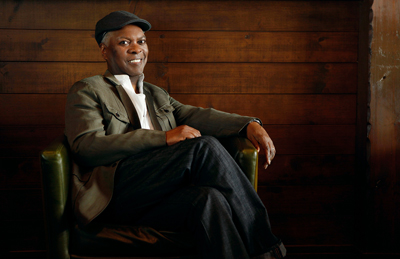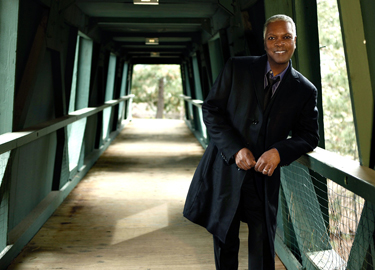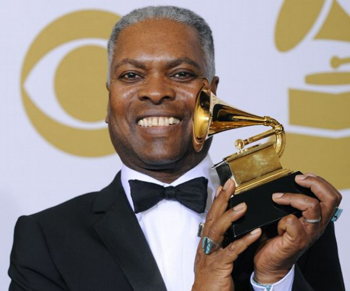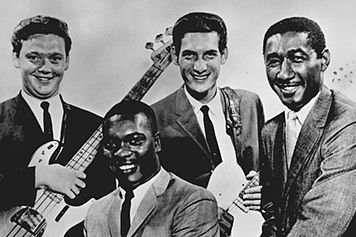“The Lorraine Motel was sacred ground at Stax Records. Steve Cropper and Eddie Floyd were in the room two doors away from where Martin Luther King was shot.”
Legendary Booker T. Jones
Front Man for Booker T and the MG’s, at MIM Oct. 3
An Interview By Mariah Fleming

The iconic Booker T. Jones, whose heart thumping Hammond organ on the soul sizzling 1962 hit Green Onions with Booker T. and the MG’s set the music world on fire, appears at the Musical Instrument Museum (MIM.org) on October 3rd, 2013 at 7:30p.m. This is the opportunity of a lifetime to see the man who is inarguably regarded as the architect of 'modern soul" music, in the acoustically perfect MIM concert theatre. I've been going to concerts in Arizona for a long time and don't ever recall Jones playing here. His new release Sound the Alarm marks Jones' return to the famed Stax Records, where he recorded Green Onions and other classic Stax hits like "Time is Tight", "Hang Em High" and "Melting Pot."
Booker T. Jones is largely responsible for the rise of modern soul music and its unceasing popularity throughout the last five decades. He's pushed the boundaries of music ever since “Green Onions” rocketed this Memphis born music prodigy into the stratosphere. In April 2013 he performed for “In Performance at The White House: Memphis Soul.” Winner of four Grammy Awards thus far, the Rock and Roll Hall of Fame and Music Hall of Fame Inductee follows his back to back Grammys for 2011's The Road to Memphis with The Roots and 2010's Potato Hole with the Drive-By Truckers featuring Neil Young, with 2013's critically acclaimed Sound the Alarm. Jones wrote or co-wrote all the songs on the release.
Jones was just 17 and living in the midst of the 1960's Civil Rights struggle when Green Onions became a million-seller. He talked to me last week about his extraordinary musical life and personal journey. The humility, enthusiasm and wonder with which Jones lives was a 45 minute life lesson I won’t forget. We talked about, among other things, how David Porter got Jones in the door the first time at Stax Records, why the Lorraine Motel in Memphis where Martin Luther King was assassinated was considered sacred ground at Stax Records, the 1967 Monterey Pop Festival appearance by Booker T and the MG's and his collaborations with some of the greatest soul artists of all time, old and new. Here’s the interview.
Q.Your 1962 groundbreaking Memphis Soul hit "Green Onions" rocked my world when I was a little kid. Green Onions is the first 45 I ever owned. I bugged my mother until she went with me to buy it.
A.Really? Thank you, that's very nice. I’m glad to hear that.
Q.Yes, it's true. And "Green Onions" got me kicked out of piano lessons by my teacher in Catholic school. I came in trying to play it, badly, instead of learning what I was assigned and it flipped her out.
A.(Chuckles) Well, Mariah, "Green Onions" is a tricky little song to play on the keyboard. I have just been working with myself on trying to play it correctly.
Q. It's a great song. I never could figure out much of it! First let's talk about your new album Sound the Alarm ok?
A. Sure
Q.It's a fantastic new release, and it marks your return to Stax Records, where you recorded Green Onions. How does it feel to be back at Stax?
A. I’m very excited about it! I'm happy to be back at Stax Records. I feel fortunate that a lot of pertinent people still want to work with me, and I’m just having a great time with music still. So I'm very grateful and thankful about that.
Q.It's like you're having a brand new resurgence with your 2010 release with the Drive-By Truckers Potato Hole, and your 2012 release, The Road From Memphis with The Roots.
A. It is. The focus is on the new R&B and it really inspires me. I'm working with a lot of old and new people. If you've listened to what I did with Gary [Clark, Jr.] and my son Ted (who appears on Sound the Alarm) it's almost pre-Stax, right out of what I was doing in the 60's. I've had a lot of fun in NYC with The Roots and in Athens, GA with the Drive-By Truckers. I'm still working with Steve Cropper some. And we just did a show at the White House where I did songs with Eddie Floyd and Queen Latifah.

Q.Yes, it was a fantastic show! And on Sound the Alarm you work with an a-list of the next 'soul' generation like Austin’s Gary Clark Jr. and Mayer Hawthorne, Anthony Hamilton, Luke James, Estelle, Sheila E, Poncho Sanchez, and Bill Withers' daughter Kori Withers. How did those collaborations come about?
A.In different ways. Pretty much organically. I met Kori 'Withers through her father who I'd known for many years, since the late 1960's.
Q. You produced Bill Withers 1971 album Just As I Am which featured your former partner the late Donald "Duck" Dunn and had Withers' Grammy winning breakthrough hit "Ain't No Sunshine"
A. Yes, and I heard Kori back over in West Virginia when they had a tribute to Bill Withers. I heard Kori sing on a film and she sounded beautiful on that!
Q.How'd you meet Gary Clark and some of the other players you work with on Sound the Alarm?
A.Gary Clark Jr. I met up at Cupertino in CA when we were playing some of our songs for Apple iTunes. I really thought he was unique. He was playing blues with a kind of hip-hop feel.
Q.Sheila E's on your new album. And Poncho Sanchez plays on "66 Impala" on Sound the Alarm. What's your connection with Sanchez and Sheila E.?
A.Well, her Uncle Coke Escovido I met when I was playing with Carlos Santana. There's a whole family legacy there, started in Oakland by people like Tito Puente and Mongo Santamaria. They're some of the first people I met in California in the 70's.
Q.How about Mayer Hawthorne and Estelle?
A.Mayer Hawthorne I met through my friend Daryl Hall. I was a big fan of Estelle's 'cause she has that song "American Boy" coming from Britain, which is such a unique departure from what R&B and pop music was doing at the time. We wrote that song "Can't Wait" expressly for Estelle. Luke James I met through the Avila Brothers. He just nailed the songs. He's a great singer and a great person.
Q.Your son Ted sure is following in your talented footsteps.
A.You know, I actually mistook my son for Joe Bonamassa one time when he was playing in our den and I thought Ted had Joe on the TV! We had a big TV in there with some big speakers. I thought it was Joe playing some blues and it was actually my son Ted playing (chuckles) and I thought, "I need to make something with him!" So that's kind of an overview of most of the people, I think. Did I leave anybody out?
Q.I don't think so! You've got a lot of people on there! On this album and the last two were you able to record live in studio with these musicians?
A.In most cases. There were a few digital.

Q. How long did it take to make this album?
A.A few months, I don't know exactly, it took longer than we expected, (laughs) but it was a beautiful process.
Q.Do you enjoy being a record producer?
A.I do, I enjoy the process, you know. It's my life. Music has been with me since I was 4 or 5 years old. I've always heard songs in my mind, melodies, chords and different instruments and I’ve always tried to reproduce the music I hear in my mind. I enjoy it. It's more than an occupation for me. It's a hobby.
Q. When you were a kid your mom played piano. What kind of music did she like to play?
A.She played gospel, classical, Debussy, Liszt, gospel hymns. I heard a lot of music when I was a kid that she played. My grandmother played also. In fact, I think my grandmother taught my mother to play.
Q.So it sounds like music is just integral to your family going way back.
A.Yes (enthusiastically) and I think I got my feeling from my mother, oh, I'm sure I did. She had such a beautiful soul. She was so expressive with her singing and her music. That's the person I mostly try to emulate in my life, my mother.
Q.When you had your big hit with Green Onions you were only 17, right?
A.Yes, and that is something I don’t think my mother would have played! (Laughs) That inspiration might just have been me!
Q.The church was a big part of your life. Did you have resistance from your family about secularizing your music?
A.They never brought that up. We were brought up in a Methodist church. It wasn't as strict as the Pentecostal church or the other Christian churches. My father supported my music. He knew I was playing in clubs and of course I was making money in the clubs. So I was never confronted with that. I was fortunate.
Q.So your parents were supportive when you had your big hit with Green Onions?
A.They were, yes. And I also played in church too. I played in the men's bible class; I took organ lessons from the church organist.
Q.Most kids with a major hit wouldn't bother to finish school, but you went on to Indiana University. Was your family pushing you to do that?
A.No, it was a forgone conclusion that any of my grandfather's progeny would get as much education as they could. I had a very fortunate childhood. There wasn't a lot of money but there was love and there was support (laughs contentedly) and I'm really happy about that.
Q.Tell me about the school your grandfather built.
A.It was on Jones Road in Marshall County in Holly Springs, Mississippi, across the road from his house. Just a little one-room grade school. And he was the teacher
Q. How did you afford to go to college in those days?
A.I had a paper route for a number of years in Memphis and then I got the job at Stax at the end of my ninth grade year. I was making $7 to $15 a day working 3 to 4 days a week so I was able to save $900 by the time June 1962 came around, enough for my 1st and 2nd semester tuition and room and board.
Q.So, when you had your hit you had already planned to go to college?
A.Yes, it was the plan, and the hit was the surprise.
Q.When's the first time you walked into Stax Records?
A.The first time I set foot thru the door I had baritone sax in hand and I was on the heels of David Porter, who was an enterprising young friend of mine, an aspiring songwriter who knew I had studied a bunch of instruments, clarinet, sax, trombone and so forth. So he came to get me out of algebra class one morning 'cause he'd been hanging out at Stax and knew Rufus and Carla Thomas wanted a baritone sax on their song called "Cause I Love You". So he rushed over and got a hall pass for me, got me out of class, rushed me down to the band room, picked up the baritone sax, and I was able to play the first opening notes to that song, and that’s how I got in the door!
Q.That’s just fantastic!
A.(Laughs, obviously enjoying the memory) It’s an amazing story!
Q. What was it like to be around all those fantastic talented people at Stax like Sam and Dave and Otis Redding? Did they welcome new talent or was there any sense of competitiveness?
A.Well, the company grew from very small, recording local artists like Vince Conway and Rufus Thomas, and by the time Otis came and Sam and Dave it was the company that people aspired to; there had been hits, some success. But each of those people was inspirational and amazing in their own way. It was like being with unbelievable people (laughs incredulously) it was crazy and fun; that’s what it was like!
Q. In England in the 60's, soul music and blues were much bigger than in the States at the time. Was that your experience there?
A.Yes. There was a different type of appreciation there, maybe because they had to make a larger sacrifice to get the music in the first place. They didn't play it on the radio stations. This type of music was not played onshore; it was played by offshore pirate stations.
Q.Like the infamous Radio Caroline, offshore "pirate radio" was responsible for much of what happened in music there, wasn't it?
A. Yeah. These records weren’t sold through the normal channels. And the fans came out to see us. Those fans are still fans! We still see the same people at the concerts!
Q.When you toured Europe back in those days with Sam and Dave, what are some of your memories of working with Sam (Moore) and Dave (Prater)?
A.They had an unbelievable synergy. There was a process of some type of unspoken communication between these guys with their singing and movements. The way they moved on stage, their dance movements, it was just unbelievable to witness. It was like when James Brown was on stage the way they moved. They just mesmerized people only there were two of them together. It was just amazing. And I was right there, two feet away! It was just unbelievable.
Q. What age were you when first you toured overseas?
A. I think I was in my early 20s and it was just a few weeks.
Q.Do you still enjoy going back there?
A.I do. I go back regularly. I play clubs, concerts and festivals with my solo band.
Q.In the heydays of Motown in Detroit and Stax in Memphis was there any competition?
A.There wasn’t any competition from our end. There was admiration. There was no chance of competition because they were doing something we weren’t capable of, however, I do feel on the other hand we were doing something they weren’t capable of in our music. It was rooted in Memphis. My music is still rooted in Memphis. At Motown they were a much more sophisticated operation and we loved every record that came out of there.
Q.I wonder if you have any memories or impressions of playing the Monterey Pop Festival?
A. What year was that festival?
Q.It was 1967. Otis Redding played there and you backed him up and you did your own set too, right?
A.Uh huh. I must have been in my early 20’s. We had just come back from England. So I was 22 or 23. And I think what happened to me personally, was that my mind was blown by the scene there in Monterey; the open doors at restaurants, free food (pauses thoughtfully) the lack of police presence…just the general vibe was new for me. So I got caught up in that and I missed most of the show talking to people backstage meeting new people. I missed Jimi Hendrix. I just got onstage in time for our show is basically what happened! (laughs)
Q.There you could eat in any restaurant you wanted, you were welcomed everywhere and all the doors were open…unlike in the South and many other parts of the United States.
A.Yes, not only that but they were feeding people who didn’t have money!
Q.Wow.
A.Yeah.

Q.Speaking of integration, you really formed the first racially integrated group with Steve Cropper and Donald 'Duck" Dunn.
A.That's true.
Q.Did you realize how rare that was at the time? Or at Stax was the environment so cool that you could do what you want?
A.There was no intent involved with that, I didn't set out to establish an interracial group. My focus was on the music. It just happened to be that the guitar player for the first song we recorded was a white guy. Then it happened (laughs) that our bass player got replaced with another white guy. And they happened to have been young white men who were disciples of The 5 Royales and various R&B groups when they were in high school and that was the aberration. You very seldom found young white men that loved R&B and Blues.
Q.Of course this year is the 50th Anniversary of the March on Washington, so do you mind if we talk a little about the 1960's?
A.Well, the 60’s were obviously a time that America should have come to claim her crown as the greatest nation of our time, and of course she fell short of that in many ways. However, there were many crowning moments in the 1960’s and the groundswell was a beautiful thing to witness and be a part of. We had our most beautiful and our most ugly moments in the 60s you know…we had Robert Kennedy and MLK shot to death…
Q.And Medgar Evers
A. And Medgar Evers. And those were events that should never have happened, but at the same time, you know, there was a galvanizing of peoples’ minds and attitudes and hearts that never happened before in history in the United States and possibly the world.
Q.Do you remember where you were or what you were doing on the day they had the March on Washington?
A. I don’t remember exactly where I was on the day of the March on Washington, but I was closely associated with Mavis Staples and Pops Staples and very closely associated with the struggle of the garbage workers in Memphis. The garbage workers were carrying cans above their heads that were leaking on these men day after day after day, year after year after year, and they couldn’t afford to feed their families. And Dr. King was the only person who would come to their rescue. Those garbage workers were well respected in the neighborhood. And the neighborhood…the society…could not have existed without them. My father would have me go out to the alley every Saturday when time came for the garbage workers to come and say "hello" to Mr. Johnson and "hello" to Mr. Smith and treat these people with the respect they deserved.
Q.What memories stand out about the day Martin Luther King was assassinated?
A. Ah, (pausing thoughtfully) added to the travesty was the fact that Dr. King was shot on property that we at Stax sort of held sacred. The Lorraine Motel was where we had our meals and our meetings. We had our recreation there at the pool area, and I’m sure that Steve Cropper and Eddie Floyd were in the room two doors away from where Martin Luther King was shot. They had a favorite room there where they wrote songs at night. So, Dr. King was shot on sacred property.
But the thing about Dr. King is he was such an enlightened man. He was working way below his level. He was enlightened in a way that we can’t even imagine. He got up there on that dais and he said: “I have been to the mountain top!” Who else has ever said that on the earth? Who could say those words? We were in the presence of a very enlightened person and we made a huge, huge mistake by not protecting him like we protect President Obama and other important people.
Q.There wasn’t any security for him?
A. No, there was nothing.
Q.Did you have trouble getting gigs in those days because your group was integrated?
A. We had minor problems. We all were raised in the south so it was nothing new.
Q.I vaguely recall some kind of race disturbance in Phoenix when I was a kid and I was so shocked. When you toured the States were you surprised to find racism all across the States?
A.Yes, it was pretty pervasive. And it was disappointing.
Q.How much do you think that has changed?
A.Well there are many views on that. There’s no doubt that race is in an elementary place, as a whole. We have a long ways to go as a race of people; I mean a race as a whole. There are forces at work, enlightened people all over who are doing work that is more powerful than the other forces actually. And that’s a fact. It’s just, to me, part of the evolution of the human race. We weren’t born enlightened so we have a ways to go.
Q.When you appeared at the White House was your whole family able to attend with you?
A.Yes! It was great. The Obama's allowed my entire family to come. And my daughter and Mrs. Obama were able to have an interaction and a conversation. It was very warm, and very rewarding…they were very gracious.
Q.How old is your daughter?
A.She’s 23 now, my youngest daughter went to Princeton and Mrs. Obama was a Princeton graduate, so they had that in common to talk about.
Q.You're having an incredible lifetime. Have you ever written a book, and if you haven’t, will you please?
A.(laughs) I am working on a book right now. And I thought I was going to be able to sit down a write a book. It’s a daunting project. But I am working on it. I appreciate you saying that.
Q.I can only imagine what your parents and grandparents would say if they knew you were at the White House with President Obama.
A. Yeah, it would have really been a revelation…uh huh, it sure would have been (chuckles) and I’m sure they’d have had some things to talk about.
September 25, 2013
Contact the author of this article at Editor@MusicAndMoreAZ.com.